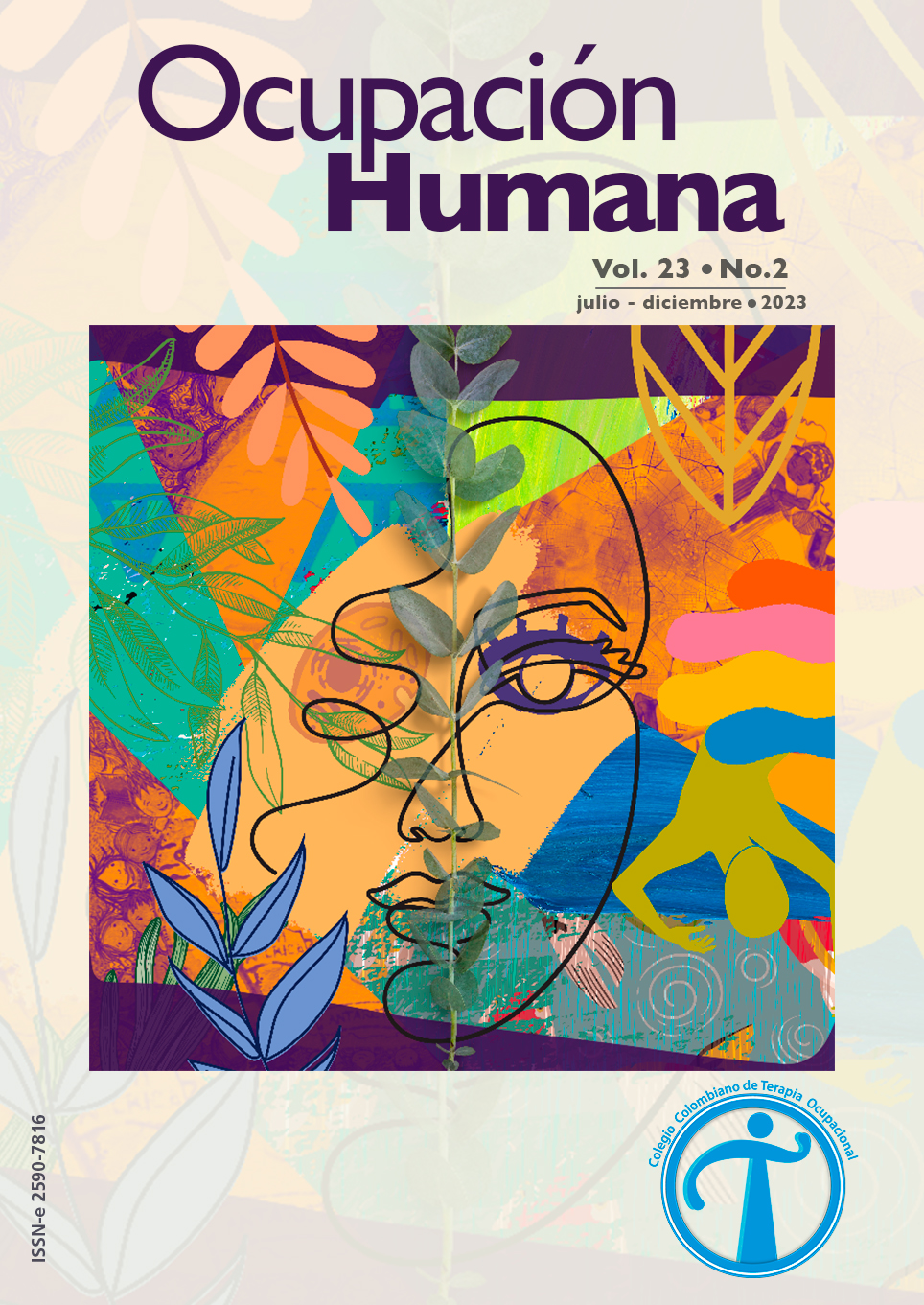Women, feminism and Occupational Therapy:
A critical analysis of the literature on gender issues impacting the profession
DOI:
https://doi.org/10.25214/25907816.1583Keywords:
Occupational Therapy, gender-based division of labor, feminism, reviewAbstract
Gender bias has been present in Occupational Therapy since its early years in the United States of America, but it was only in the last decades of the 20th century that this fact began to be problematized. This article presents a critical literature review that aims to summarize, analyze and discuss articles that address the presence and role of women and the impact of gender segregation in the profession. The review was conducted by surveying and identifying relevant material in the Occupational Therapy literature in English, Portuguese and Spanish, and no time frame was established. Twenty-nine articles were analyzed and discussed under four topics: gender concept in the texts; women and feminism in the history of Occupational Therapy; gender segregation: female stereotypes and women’s culture; gender and power relations: the struggle for recognition. The analyses pointed to the importance of recovering the connections with feminism present in the emergence of the profession. The feminist perspective can strengthen Occupational Therapy's theoretical and philosophical bases and help understand and address the gender inequalities in the lives of occupational therapists.
Downloads
References
Alonso-Ferreira, M., Farias, L. & Rivas-Quarneti, N. (2022). Addressing the gender construct in occupation-based research: A scoping review. Journal of Occupational Science, 29(2), 195-224. https://doi.org/10.1080/14427591.2021.1955943
Bardin, L. (1977). Análise de conteúdo. Edições 70.
Benetton, M. J. (2008). Terapia ocupacional: Uma profissão dos anos dourados. Revista do Centro de Estudos em Terapia Ocupacional, 11(1), 3-17.
Benetton, M. J. & Varela, R. C. B. (2001). Eleanor Clarke Slagle. Revista do Centro de Estudos em Terapia Ocupacional, 6(1), 32-35.
Ferrufino, A.H., Miranda, V.L., Morrison, R., Yates, G.M. & Silva, C.R. (2019). Transacionalismo, interseccionalidade feminista e método narrativo: aportes para a pesquisa em Terapia Ocupacional e Ciência Ocupacional. Revista Interinstitucional Brasileira de Terapia Ocupacional, 3(1), 150-161. https://doi.org/10.47222/2526-3544.rbto17010
Figueiredo, M. O., Lourenço, G. F., Zambulin, M. C., Joaquim, R. H. V. T., Emmel, M. L. G., Barba, P. D. & Fornereto, A. P. N. (2018). Terapia ocupacional: uma profissão relacionada ao feminino. História, Ciências, Saúde – Manguinhos, 25(1), 115-126. https://doi.org/10.1590/S0104-59702018000100007
Foucault, M. (1997). Il faut defendre la soieté. Editions du Seuil.
Foucault, M. (2000). O que são as luzes. In: Arqueologia das ciências e história dos sistemas de pensamento. Ditos e Escritos II (pp. 335-351). Forense Universitária.
Frank, G. (1992). Opening feminist histories of occupational therapy. American Journal of Occupational Therapy, 46(11), 989-999. https://doi.org/10.5014/ajot.46.11.989
Frank, G. & Zemke, R. (2009). Occupational therapy foundations for political engagement and social transformation. In N. Pollard, D. Sakelarious, & F. Kronenberg (Eds.), A political Practice of Occupational Therapy (pp. 111-135). Churchill Linvingstone.
Froehlich, J. (1992). Proud and visible as occupational therapists. American Journal of Occupational Therapy, 46(11), 1042-1044. https://doi.org/10.5014/ajot.46.11.1042
Gilligan, M. B. (1976). Developmental stages of occupational therapy and the feminist movement. American Journal of Occupational Therapy, 30(9), 560-567.
Gómez, L., Palma, D. & Rodríguez, L. (2016). Mujer ciudadana, universitaria y terapeuta ocupacional. Contrastes contextuales de los años sesentas y setentas desde la Universidad del Valle y la Universidad Nacional de Colombia. Revista Ocupación Humana, 16(2), 81-92. https://doi.org/10.25214/25907816.139
Grandón, D. (2023). El cuidado como cuestión de tiempo: una perspectiva feminista sobre el tiempo cotidiano de cuidadoras de personas adultas con discapacidad. Revista Ocupación Humana, 23(1), 8-23. https://doi.org/10.25214/25907816.1494
Grant, M. J. & Booth, A. (2009). A typology of reviews: An analysis of 14 review types and associated methodologies. Health Information and Libraries Journal, 26(2), 91–108. http://onlinelibrary.wiley.com/doi/10.1111/j.1471-1842.2009.00848.x/full
Hamlin, R. (1992). Embracing our past, informing our future: A feminist re-vision of health care. American Journal of Occupational Therapy, 46(11), 1028-1035. https://doi.org/10.5014/ajot.46.11.1028
Hamlin, R. B, Loukas, K. M., Froehlich, J. & MacRae, N. (1992) Feminism: an inclusive perspective. American Journal of Occupational Therapy, 46(11), 967-970. https://doi.org/10.5014/ajot.46.11.967
Liedberg, G. M., Björk, M. & Hensing, G. (2010). Occupational therapists’ perceptions of gender: A focus group study. Australian Occupational Therapy Journal 57(5), 331-338. https://doi.org/10.1111/j.1440-1630.2010.00856.x
Lima, E. M. F. A. (2021). Terapia ocupacional: uma profissão feminina ou feminista? Saúde em Debate 45(Especial 1), 154-167. https://doi.org/10.1590/0103-11042021E112
Litterst, T. (1992). Occupational therapy: The role of ideology in the development of a profession for women. American Journal of Occupational Therapy, 46(11), 20-25. https://doi.org/10.5014/ajot.46.1.20
Lopata, H. Z., & Thorne, B. (1978). On the Term “Sex Roles.” Signs, 3(3), 718–721. http://www.jstor.org/stable/3173192
Loukas, K. M. (1992). Motherhood, occupational therapy, and feminism: Weaving or unraveling the fibers of our lives? The American Journal of Occupational Therapy, 46(11), 1039-1041. https://doi.org/10.5014/ajot.46.11.1039
Melo, D. O. C. V. (2015). Em busca de um ethos: narrativas da fundação da terapia ocupacional na cidade de São Paulo (1956-1969) [Dissertação de Mestrado, Universidade Federal de São Paulo].
Miller, R. (1992). Interwoven threads: Occupational therapy, feminism, and holistic health. American Journal of Occupational Therapy, 46(11), 1013-1019. https://doi.org/10.5014/ajot.46.11.1013.
Moraes, R. (2003). Uma tempestade de luz: A compreensão possibilitada pela análise textual discursiva. Ciência & Educação, 9(2), 191-211. https://doi.org/10.1590/S1516-73132003000200004
Monzeli, G. A., Morrison, R. & Lopes, R. E. (2019). Histories of occupational therapy in Latin America: The first decade of creation of the education programs. Cadernos Brasileiros de Terapia Ocupacional, 27(2), 235-250. https://doi.org/10.4322/2526-8910.ctoAO1631
Morrison, R. (2011). (Re)conociendo a las fundadoras y "madres" de la terapia ocupacional: una aproximación desde los estudios feministas sobre la ciencia. TOG (A Coruña), 8(14), 1-21.
Morrison, R. (2015). Los comienzos de la terapia ocupacional en Estados Unidos: una perspectiva feminista desde los estudios de ciencia, tecnología y género (siglos XIX y XX). Historia Crítica, 62(1), 97-117. https://doi.org/10.7440/histcrit62.2016.05
Morrison, R. (2016). Pragmatist epistemology and Jane Addams: fundamental concepts for the social paradigm of occupational therapy. Occupational Therapy International, 23(4), 295-304. https://doi.org/10.1002/oti.1430
Morrison, R. (2021). La terapia ocupacional. Una interpretación desde Eleanor Clarke Slagle. Fides Et Ratio [online], 21(21), 103-126.
Morrison, R. & Araya, L (2018). Feminismo(s) y terapia ocupacional. Preguntas y reflexiones. Revista Argentina de Terapia Ocupacional, 4(2), 60-72. https://www.terapia-ocupacional.org.ar/revista/RATO/2018dic-conf.pdf
Pollard, N. & Walsh, S. (2000). Occupational therapy, gender and mental health: An inclusive perspective? British Journal of Occupational Therapy, 63(9), 425-431. https://doi.org/10.1177/030802260006300904
Reese, C. C. (1987). Gender bias in an occupational therapy text. American Journal of Occupational Therapy, 41(6), 393-396. https://doi.org/10.5014/ajot.41.6.393
Rivera, M. I. M., Valdebenito, N. C. A., Salazar, R. L. C. G. & Molina, F. C. M. (2017). Terapeutas ocupacionales: influencia del género en su desempeño laboral. Revista Chilena de Terapia Ocupacional, 1(01), 155-163.
Sarmiento, B. M., Morrison, R., Cáceres, D. P. & Reyes, B. R. (2018). Percepción de la construcción de género en estudiantes de terapia ocupacional: una aproximación al género en la vida cotidiana. Cadernos Brasileiros de Terapia Ocupacional, 26(1), 163-175. https://doi.org/10.4322/2526-8910.ctoAO112
Testa, D. (2012). Aportes para el debate sobre los inicios de la profesionalización de la terapia ocupacional en Argentina. Revista Chilena De Terapia Ocupacional, 12(1), 72–87. https://doi.org/10.5354/0719-5346.2012.22054
Testa, D. E. & Spampinato, S. B. (2010). Género, salud mental y terapia ocupacional: algunas reflexiones sobre la influencia de la historia de las mujeres y la perspectiva de género en nuestras prácticas. Revista de Terapia Ocupacional da Universidade de São Paulo, 21(2), 174-181. https://doi.org/10.11606/issn.2238-6149.v21i2p174-181
Vogel, B., Benetton, M. J. & Goubert, J. P. (2002). Terapia ocupacional: A história de uma profissão feminina. Revista do Centro de Estudos em Terapia Ocupacional, 7(1), 38-43.
Wilcock, A.A. (1998). An occupational perspective of health. Slack Inc.
Yerxa, E. J. (1975). On being a member of a feminine profession. American Journal of Occupational Therapy, 29(10), 597-598.
Published
How to Cite
Issue
Section
License
Copyright (c) 2023 Human Occupation Journal

This work is licensed under a Creative Commons Attribution-NonCommercial-ShareAlike 4.0 International License.

| Article metrics | |
|---|---|
| Abstract views | |
| Galley vies | |
| PDF Views | |
| HTML views | |
| Other views | |
Funding data
-
Universidade de São Paulo
Grant numbers Programa Unificado de Bolsa de Estudos da USP, projetos 3031 e 3204 -
Universidade de São Paulo
Grant numbers Programa Unificado de Bolsa de Estudos da USP, projetos 3031 e 3204











